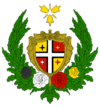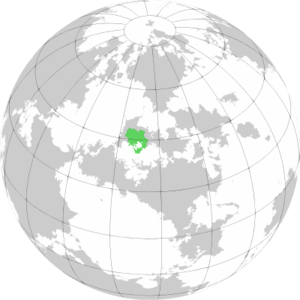Lucentia: Difference between revisions
No edit summary |
m (Add lead and category) |
||
| (One intermediate revision by one other user not shown) | |||
| Line 41: | Line 41: | ||
| nation number = 146 | | nation number = 146 | ||
}} | }} | ||
'''Lucentia''' is a country in Thultannia on the continent of [[Anaria]]. It is a member of the [[Thultannian Union]]. | |||
==History== | ==History== | ||
===Rose Crown Empire=== | |||
===Lucentian Civil War=== | ===Lucentian Civil War=== | ||
Lucentia, like much of southern and western Thultannia, is majority Peratolian Orkanan. Since the Pan-Anarian War, more extremist forms of Peratolian ideology – unitarianism – began taking root in the region. Lucentian extremists would often travel to Anaria Minor as Shrine Guardians (gaining military experience and training fighting Izhaics) | Lucentia, like much of southern and western Thultannia, is majority [[Peratolian Orkanan]]. Since the [[Pan-Anarian War]], more extremist forms of Peratolian ideology – [[unitarianism]] – began taking root in the region. Lucentian extremists would often travel to Anaria Minor as Shrine Guardians (gaining military experience and training fighting Izhaics). More radical unitarian elements steadily organised throughout the 7500s, becoming a significant political and paramilitary force in Lucentia. | ||
More radical unitarian elements steadily organised throughout the 7500s, becoming a significant political and paramilitary force in Lucentia. | The Lucentian government (led by liberals at the time) intervened in the Anisoran Civil War, supporting the Cadrian Republic’s declaration of independence in 7613. However, the Anisoran Civil War became a proxy conflict for an emergent split within Lucentia itself, as thousands of unitarians and Peratolian extremists volunteered to fight for the [[Anisora]]n regent against Lusavanic separatists in Anaria Minor. | ||
The Lucentian government (led by liberals at the time) intervened in the Anisoran Civil War, supporting the Cadrian Republic’s declaration of independence in 7613. However, the Anisoran Civil War became a proxy conflict for an emergent split within Lucentia itself, as thousands of unitarians and Peratolian extremists volunteered to fight for the | |||
The Anisoran Civil War ended in 7616 with the independence of Cadria and Lusavan, with unitarian fighters returning to Lucentia after the war. Such fighters had built strong ideological and military connections to the unitarian regime of the Anisoran | The Anisoran Civil War ended in 7616 with the independence of Cadria and [[Lusavan]], with unitarian fighters returning to Lucentia after the war. Such fighters had built strong ideological and military connections to the unitarian regime of the Anisoran regent, Lord Laurito, whose regime sought to support them in return. | ||
The Lucentian unitarian movement began agitating over the coming decades, but Anisora’s embroilment in overseas colonial conflicts prevented a concerted Anisoran effort to arm and equip Lucentian unitarian paramilitary units. | The Lucentian unitarian movement began agitating over the coming decades, but Anisora’s embroilment in overseas colonial conflicts prevented a concerted Anisoran effort to arm and equip Lucentian unitarian paramilitary units. | ||
By 7638, the Anisoran regent Lady Valero quashed an attempted coup and hardened her governments stance abroad. It massively expanded support for unitarian extremist movements across Anaria, including in Lucentia. | By 7638, the Anisoran regent Lady Valero quashed an attempted coup and hardened her governments stance abroad. It massively expanded support for unitarian extremist movements across Anaria, including in Lucentia. | ||
7640: Lucentian terrorist attack in a major city is blamed on | |||
7640: Lucentian terrorist attack in a major city is blamed on [[Izha]]ic extremists, triggering violent anti-Izhaic pogroms. Paramilitary violence begins to increase massively, with the police struggling to contain it. | |||
Elections in 7641 return an historic result for the Unitarian party, though still short of a parliamentary majority. Paramilitaries attempt to storm parliament. | Elections in 7641 return an historic result for the Unitarian party, though still short of a parliamentary majority. Paramilitaries attempt to storm parliament. | ||
7642: The leader of the Lucentian Unitarian Movement addresses the nation, stating that a transitional council has been established. His troops secure the parliament in the capital and place the liberal | 7642: The leader of the Lucentian Unitarian Movement addresses the nation, stating that a transitional council has been established. His troops secure the parliament in the capital and place the liberal prime minister under arrest. Anisora is the first (and one of the only) nations to recognise the new government, and sends military assistance and paramilitary forces. | ||
Civil | |||
The invasion triggers a robust response from Lucentia’s neighbours, with Saoirth, | Civil war breaks out between the unitarian and government forces (7642-7643), resulting in the establishment of a unitarian regime. Lucentia withdraws from the Wessian Accords. Moving to consolidate its control, the government invades neighbouring Ardar in a bid to consolidate control of the Western Strait to contain Izhaic trade routes. | ||
The invasion triggers a robust response from Lucentia’s neighbours, with [[Saoirth]], [[Einhafan]], [[Cladania]] and [[Halland]] intervening. The resultant war (7645-7648) ends in the collapse of the unitarian regime and the restoration of democracy to Lucentia, paving the way for a post-war reconstruction and greater pan-Thultannian cooperation. | |||
[[Category:Countries]][[Category:Countries in Anaria]] | |||
Latest revision as of 05:15, 17 November 2024
| Four Kingdoms of Lucentia | |
| Flag | Coat of arms |
|---|---|

|

|
| Motto: Four Brothers, indivisible in purpose and destiny | |
| Anthem: Choir of the seas and fields | |
| Locator map | |

| |
| Capital city | Anarian City |
| Largest city | New Anaria |
| Official language | Hallish |
| Other languages | Middle Hallish |
| Ethnic group | Emther |
| Religion | Orkanan |
| Demonym(s) | Lucenish |
| Government | |
| Government Type | Federated Kingdom |
| King Elect | Dominic I of Galdémar |
| Federal Chancellor | Clara Winchell-Vitale |
| Legislature | Four stars chamber |
| Establishment | |
| tbc | tbc |
| Area | |
| Total | 557,602.89 km2 |
| Water % | tbc |
| Population | |
| Total | 52,150,033 |
| Density | 93.53/km2 |
| Economy | |
| Economy type | Capitalist |
| GDP (total) | Ꞡ 1,612,136,329,291.87 |
| GDP per capita | Ꞡ 30,913.43 |
| Inequality index | tbc |
| Development index | tbc |
| Other information | |
| Time zone | -1 |
| Driving side | right |
| Calling code | tbc |
| Internet code | tbc |
| Nation number | 146 |
Lucentia is a country in Thultannia on the continent of Anaria. It is a member of the Thultannian Union.
History
Rose Crown Empire
Lucentian Civil War
Lucentia, like much of southern and western Thultannia, is majority Peratolian Orkanan. Since the Pan-Anarian War, more extremist forms of Peratolian ideology – unitarianism – began taking root in the region. Lucentian extremists would often travel to Anaria Minor as Shrine Guardians (gaining military experience and training fighting Izhaics). More radical unitarian elements steadily organised throughout the 7500s, becoming a significant political and paramilitary force in Lucentia. The Lucentian government (led by liberals at the time) intervened in the Anisoran Civil War, supporting the Cadrian Republic’s declaration of independence in 7613. However, the Anisoran Civil War became a proxy conflict for an emergent split within Lucentia itself, as thousands of unitarians and Peratolian extremists volunteered to fight for the Anisoran regent against Lusavanic separatists in Anaria Minor.
The Anisoran Civil War ended in 7616 with the independence of Cadria and Lusavan, with unitarian fighters returning to Lucentia after the war. Such fighters had built strong ideological and military connections to the unitarian regime of the Anisoran regent, Lord Laurito, whose regime sought to support them in return.
The Lucentian unitarian movement began agitating over the coming decades, but Anisora’s embroilment in overseas colonial conflicts prevented a concerted Anisoran effort to arm and equip Lucentian unitarian paramilitary units.
By 7638, the Anisoran regent Lady Valero quashed an attempted coup and hardened her governments stance abroad. It massively expanded support for unitarian extremist movements across Anaria, including in Lucentia.
7640: Lucentian terrorist attack in a major city is blamed on Izhaic extremists, triggering violent anti-Izhaic pogroms. Paramilitary violence begins to increase massively, with the police struggling to contain it.
Elections in 7641 return an historic result for the Unitarian party, though still short of a parliamentary majority. Paramilitaries attempt to storm parliament. 7642: The leader of the Lucentian Unitarian Movement addresses the nation, stating that a transitional council has been established. His troops secure the parliament in the capital and place the liberal prime minister under arrest. Anisora is the first (and one of the only) nations to recognise the new government, and sends military assistance and paramilitary forces.
Civil war breaks out between the unitarian and government forces (7642-7643), resulting in the establishment of a unitarian regime. Lucentia withdraws from the Wessian Accords. Moving to consolidate its control, the government invades neighbouring Ardar in a bid to consolidate control of the Western Strait to contain Izhaic trade routes. The invasion triggers a robust response from Lucentia’s neighbours, with Saoirth, Einhafan, Cladania and Halland intervening. The resultant war (7645-7648) ends in the collapse of the unitarian regime and the restoration of democracy to Lucentia, paving the way for a post-war reconstruction and greater pan-Thultannian cooperation.